- Home
- Anne Schraff
Unbroken Page 7
Unbroken Read online
Page 7
David laughed and made the quick call to Animal Control. Then Jeff spoke to David.
“Last week I got a call from a guy saying that the councilman was doing a good job,” Jeff remarked. “I almost fell off my chair. You get so few of those.”
“Mr. Ibarra is doing a great job,” Livy remarked. “Just one thing alone has impressed me so much. You know that Nicolo Sena Scholarship program from years ago? Business and government sponsored promising kids for college. It was named for the first Hispanic boy from the barrio who died in Vietnam.”
David had heard about it. “Well,” Livy went on, “when Monte Esposito was councilman, he didn’t go out and enlist businesses, so the scholarship went unfunded and died out. Mr. Ibarra got it going again. He almost went on his knees to local businesses, pleading for matching funds. Not many people know this. But he put some of his own money in, and he’s not a rich man. Now kids who couldn’t have afforded college can go. I feel so proud to be working for a man like that.”
“Yep,” David agreed, “he’s a pretty wonderful guy.”
Livy Majors looked at David and smiled. It was a very warm smile. If things were different, David might have gotten ideas about dating her.
“You know,” David commented to Livy Majors, “I have a friend, Ernie Sandoval. His father got his teacher training through that scholarship. Ernie’s uncle, he’s a lawyer. He got help from the scholarship too.”
“Yeah,” Livy said. “My mother got her nursing school education that way too. Before the Nicolo Sena fund, there was nothing in the barrio that targeted poor Hispanic kids. It was always my mom’s dream to be a nurse, and that made it possible. Now she’s an RN in intensive care at the hospital, and she’s so happy.”
Livy noted David’s puzzlement and smiled. David’s expression said, “But you’re not Hispanic.”
Livy explained. “My mom’s maiden name is Bejarano.”
“Oh, I see,” David said, returning her smile.
CHAPTER SEVEN
David went on to solve several small problems over the rest of the afternoon. At the end of his day, he went down to the pickup truck for the trip home. For the first time in more than two years, he unlocked his own vehicle. “Hey,” he thought, “I’m gonna do the afternoon rush hour like a normal person.”
He’d bought the pickup shortly before he was arrested. Paul had just started to drive at the time, and David often loaned the truck to his kid brother. When David was sent to prison, the truck became Paul’s wheels. Now that Paul had the Jaguar, David had his wheels back.
David had missed so many of the ordinary things in prison. Stopping by a fast-food place to grab something he was suddenly hungry for . . . buying a new pair of jeans at the big box store . . . just taking off for the beach when he felt like cooling off. Perhaps most of all, he missed sticking his key into the ignition and driving. That was something he missed every day. And now, as David merged into the flow of traffic, he felt exhilarated. He was just another young dude coming home from work.
David was pulling into the apartment parking lot when his phone rang. He parked and grabbed his cell. “Yeah?”
“David,” Emilio Ibarra said, “the council meeting just ended. We passed the one cent sales tax increase, thank God. We won’t have to lay off any more cops.”
“That’s great, Mr. Ibarra,” David responded. “I guess we’ll get some calls tomorrow.”
“You can bet on it,” the councilman replied. “Listen, David, I tried to get you before you left today, so I’ll tell you now. This won’t wait until tomorrow.”
David froze in apprehension. Things were going too well. Something bad had to happen. Maybe somebody found out about his past. Maybe someone important resented his being on Mr. Ibarra’s staff. David broke out in a cold sweat. “Yeah,” he said, “what’s up?”
“David,” Mr. Ibarra answered, “I am hearing so many good things about you. There is one guy, I could have sworn he was the devil. He’s been a thorn in my side since I got this job. He texted me earlier today. He said a young guy in my office—David-something—finally treated him like a human being. He said you didn’t even laugh at him. You know the one I mean, David. He’d been abducted by aliens who planted a radio receiver in his brain.”
“Oh yeah,” David recalled. He smiled, relieved that he wasn’t in trouble. “The guy with the aluminum foil turban. How could I forget him? He’s so lonely; all he does is watch those shows about aliens. But he’s not a bad dude. He actually gave me ten bucks for the Sena Scholarship fund. Thanks for telling me, Mr. Ibarra.”
“Thank you,” Mr. Ibarra responded, “for being much more than I thought when I hired you, David.”
The councilman had to end the call then.
As David put the phone in his pocket, he said softly, “No, sir, thank you.” As David walked to the apartment, he thought about the elderly man who said he was abducted. He remembered the desperate look in the man’s eyes. The old man had mental problems, but he was harmless. All David did for him was to treat him with respect. In the end, it was all the man wanted. David told the man that the aliens probably meant no harm. But if anything really bad happened, he should call David’s direct line at the office. David would talk to him again.
On his way to Cesar Chavez High the next morning. Ernesto Sandoval was thinking about Grandparents Day. He had to get the committee on that project started. He was delighted that so many kids were getting involved. They’d prepare a nice breakfast. Then they’d put on a fashion show and music revue. It would feature the songs their grandparents would remember from years ago. Finally, of course, there’d be the cleanup.
As Ernesto walked from the parking lot, he noticed Clay Aguirre walking toward him. Ernesto sighed inwardly. “This can’t be good,” he thought. So early in the morning and already a problem.
“Hey, Sandoval,” Clay cried, “you know that stupid kid’s picture you passed out at the senior meeting?”
“Yes,” Ernesto sighed, “I’m sorry if it bothered you, Clay. Rod Garcia already made it clear that it bothered some people. He didn’t want to take time from senior class business to find a lost kid. Actually—”
Clay cut him off. “On the back of the picture, there’s somebody’s cell number—a dude named David. I don’t know this jerk, and I don’t want to get mixed up with him. The thing is, I mighta seen the kid.”
Ernesto looked at Clay with shock. “Oh man, really? Where?”
“Don’t get all excited,” Clay demanded. “And don’t tell anybody I came to you about this. I don’t want them thinking . . .” His voice trailed. “Anyway, I was over on Polk this morning, down by the old empty warehouses. I needed to pick up some salmon for my parents. There’s a fish market down there.”
Ernesto’s look probably was saying, “C’mon, man, get to the point.”
“Anyway,” Clay went on, “I seen this kid going through a dumpster. It was right next to a little Asian market. I guess the market tosses leftover food. The kid was in the dumpster, looking for food, I guess. I can’t swear it was him, but it looked like the kid in the picture.”
“Oh man, thanks, Clay!” Ernesto exclaimed. “I know you don’t like me. But you were man enough to put that aside for the sake of the kid. I give you props for that, dude.”
“Ah, skip the mush, Sandoval,” Clay replied sourly. “Probably isn’t even the kid you’re looking for.” Clay turned and hurried away, as if he were embarrassed by his own act of decency.
Ernesto got on his cell phone and called David Morales. He told him what Clay had said. “We’re not sure, of course, but . . .”
“Thanks, Ernie,” David said. He jumped up from his desk and went into Mr. Ibarra’s office. “Mr. Ibarra, do you remember that lady, Mrs. Padilla?”
Mr. Ibarra clasped his head. “Don’t tell me she’s here again!” he groaned.
“No, listen,” David responded excitedly. “Some friends of mine passed her kid’s picture around, and they maybe got a lead. He may be
hiding in an old warehouse on Polk. The guy saw him climbing in a dumpster and looking for food.”
Mr. Ibarra’s face dissolved in horror. “Ay, Dios mio!”
“Mr. Ibarra, I know this is asking a lot,” David inquired. “But could I have a little time off to go down there and see if it’s Bobby? Who knows what could happen to a little guy like that.”
“Of course, yes, yes,” Mr. Ibarra agreed. “The day is thankfully quiet. Jeff and I can handle the office.” He rose and led the way to Livy’s desk. To her, the councilman said, “David thinks they may have spotted Mrs. Padilla’s lost boy. I think it would be good if you went with David. The boy must be terrified, and if he sees a girl . . .”
“Yes, certainly,” Livy Majors replied, grabbing her sweater against the chill wind outside.
They went to David’s pickup. As the truck pulled out of the lot, Livy posed a question. “What’s the story about the boy? I never dealt with his mother.”
“He had a fight with his mother,” David explained. “And she threatened to send him to his father. The parents are divorced, and the boy’s frightened of his father. Bobby Padilla’s been away from home for a week, and he’s only fourteen years old. His mother’s devastated. She said the boy is all she has in the world. She says she wouldn’t want to live if . . . you know, something happened to him.”
“Poor woman!” Livy gasped. “But why did she keep coming to Mr. Ibarra’s office for help? Why didn’t she call the police?”
“She did call the police,” David answered. “But there are just too many runaways. The police do their best, but I guess there’re thousands of such kids. If the police think the kid’s been kidnapped, then they go all out but . . . Anyway, she said she voted for Mr. Ibarra, and she thought he might be able to help. Then I got into it.”
“Oh, David,” Livy commented, “you really put your heart into your job. You’re such a good heart.” She reached over and patted David’s knee. “You must have wonderful parents to have raised such a compassionate person.”
David didn’t say anything as they turned onto the freeway ramp. But the moment the girl had touched his knee, he trembled inside. He realized again that he had feelings for a girl.
“We seem about the same age, David,” Livy remarked. “I graduated from Cesar Chavez High about five years ago, but I don’t remember you. Of course, it’s a big school.”
“Uh, I didn’t go to Chavez,” David explained. “I was living in Los Angeles at the time. We moved down here, my brother and me, and he went to Chavez. He’s younger than me.”
“Oh!” Livy responded. “Well, if he’s younger than you, then I wouldn’t have known him either.”
David was glad for the Washington turnoff. They were almost there. David remembered the old warehouse and the Asian market on Polk. It had been started decades ago by refugees from Vietnam who were called the “boat people.”
David drove slowly down Polk Street, looking for the Asian market. “Look,” Livy pointed, “that brick building with all the signs in Vietnamese.”
“Yeah, and the warehouse,” David noted. “It’s got broken windows. Easy for a kid to get in. It’s awful to think of a fourteen-year-old kid in there with maybe dangerous older men. He’s gotta be scared, but what’s he gonna do? He hates his father, and he thinks his mother doesn’t love him anymore. He has nowhere to go.”
“David, the way you talk about it,” Livy commented, “it almost sounds as if something similar happened to you. Did you ever run away from home?” Livy’s eyes filled with interest.
“Uh yeah, a few times,” David admitted. But he hadn’t really run away from home. He’d run away from the dysfunctional families he was placed with. By the time David was fourteen, home was a distant memory.
They parked and got out of the truck, walking slowly toward the warehouse. “Livy, there may be a back entrance,” David said. “When he hears somebody coming in the front, he might just try to run out the back. I’m goin’ around the back. You go in that door that’s ajar, but be real careful. Open it slowly, and call his name—Bobby. If he hears a female voice, it could put him at ease a little.”
Livy Majors waited a few seconds for David to get around to the back. Then she gently pushed the front door open and called out. “Bobby? It’s okay, Bobby. We came to help you. Don’t be afraid.”
A wild clatter erupted inside. Someone had been sitting on a crate, eating whatever he found in the dumpster. He flew toward the back door. As he exploded out into the alley, David grabbed him.
“It’s okay, muchacho,” David assured him. “Nobody’s gonna hurt you. Take it easy.”
The boy struggled against David, kicking him violently in his shins. Terror filled the boy’s dark eyes as David held his thin shoulders firmly.
The boy was Bobby Padilla all right. There was no mistaking those big brown eyes, the small cleft in his chin.
Livy Majors arrived around to the back quickly, having heard the commotion. The sight of her seemed to quiet the boy a little. “Bobby,” Livy said softly. “We’re here to help you. You don’t belong living in a dirty, cold warehouse.”
“Lemme alone!” Bobby Padilla sobbed, big tears rolling down his brown cheeks. His hair was shining black, like a raven’s wing.
David held firmly onto the boy’s upper arm and guided him slowly to a grassy knoll behind the warehouse. “Bobby,” David explained, “your mother’s crying her eyes out. She wants you to come home. She’s so sad without you that she doesn’t want to live.”
“No!” the boy cried defiantly. “She don’t like me no more. She’s gonna send me to mi padre, who beats me with a stick! She told me I’m bad, an’ she don’t want me no more.”
“Bobby,” David persisted, “she’s sorry she said those mean things to you. She was worried about how you were acting. But she blames herself for being mean to you. She loves you, Bobby. She wants you to come home.”
“I can’t go home,” the boy cried. “I am bad.”
“Okay,” David commanded, “calm down and stay right here a minute.”
David dialed Mrs. Padilla’s phone. When she heard David’s voice, she asked excitedly, “You have news of my son?”
“Mrs. Padilla, Bobby’s here with us. He’s fine, but he’s very scared and confused.” David looked the boy up and down. “And pretty dirty too.” To Bobby, he said teasingly, “Man, you gotta get home at least for a good hot shower.” The boy’s face seemed to relax a little.
“Bobby! Mi hijo!” Mrs. Padilla screamed so loudly that Bobby heard her voice. His eyes widened.
David handed the phone to Bobby. The boy was shaking and crying.
“Bobby,” his mother sobbed, “I love you! I love you more than anything in the world. You are my heart and my soul. I am empty without mi hijo!”
“You said you’d send me to mi padre,” the boy whispered.
“Never, never, nunca!” Mrs. Padilla pledged. “I swear I will never do that.”
Bobby wiped his nose with his sleeve. His big brown eyes glistened with tears as he handed the phone back to David.
“Mrs. Padilla,” David told the woman, “we’re bringing him home.”
They drove to the small apartment on Oriole Street. Mrs. Padilla was standing out in front. Then she saw the pickup truck with her son inside. Even before David brought it to a full stop, she ran toward the truck, screaming and crying. She grabbed Bobby as he climbed from the truck, kissing him and hugging him. She didn’t care that he was very grimy and dirty from his week on the street. For the first time since David had seen Bobby, the boy laughed.
“No, Mama, no!” he begged, as she kissed him over and over. David could tell the boy was embarrassed, but he also looked happy.
Then Mrs. Padilla turned to David. Before he could stop her, she grabbed his hand and kissed it. Then she kissed Livy’s hand. “You are santos,” she cried. “I thought I would never see my little boy again, and you brought him home to me.”
“I’m not a little bo
y, Mama,” Bobby protested. “I’m almost a man.”
“You are my baby!” Mrs. Padilla cried. She put her arm around the boy’s shoulders and led him toward their apartment. Before going inside, Mrs. Padilla turned and waved to David and Livy. Bobby smiled a little and waved too. David could see that he was glad to be home. Bobby would not come right out and say it, but he had to be very glad to be home. The past week had to have been the most miserable of his life.
“Wow!” Livy exclaimed as she followed David back to his pickup. “This morning, all I was hoping for was a good hair day. Maybe a fresh BLT for lunch. Now I’ve been canonized! Think of it, David. We are santos!”
David laughed. “You were a big help, Livy. I couldn’t have managed this without you. If I’d gone alone, the boy would have fled through the back door. We mighta lost him.”
“Well, I’m glad I was helpful, David,” Livy responded. “But the truth is, this is your project. You deserve the credit. What if I’d been in the office when Mrs. Padilla came in pleading for help in finding her son? I would have maybe called the police and asked them to look a little harder for Bobby. I wouldn’t have got into it as you did. You’re really incredibly special. I mean, Jeff’s a great guy, efficient, hard working. But you . . . I mean, where do people like you come from?”
David wasn’t going to answer that question. He held the door for Livy to get in the pickup.
When they got back to the office, the first person they saw was Jeff Caudillo. “Well,” Jeff announced sarcastically, “here are the angels of mercy returning from their crusade. How did it go? Let’s see. No puncture wounds. So the kid didn’t try to stick you with a knife? He came peaceably?”
“He’s just a scared little boy,” David responded. “He was worried his mom was going to send him to his father—a kind of a brute, I guess. Once he knew we were on his side, it was fine.”
David went into Mr. Ibarra’s office to report. “I want to thank you for letting Livy and me look for Bobby. We found him and took him home.”

 Unbroken
Unbroken Wildflower
Wildflower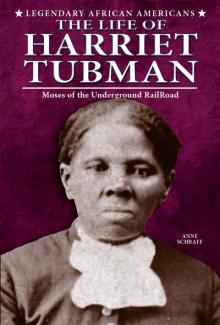 The Life of Harriet Tubman
The Life of Harriet Tubman Like a Broken Doll
Like a Broken Doll Rosa Parks
Rosa Parks No Fear
No Fear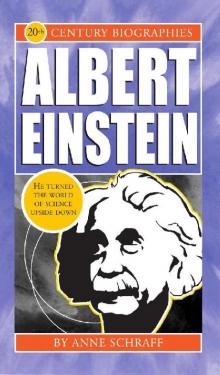 Albert Einstien
Albert Einstien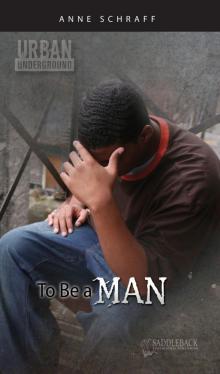 To Be a Man
To Be a Man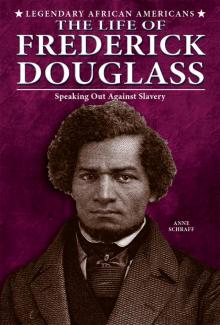 The Life of Frederick Douglass
The Life of Frederick Douglass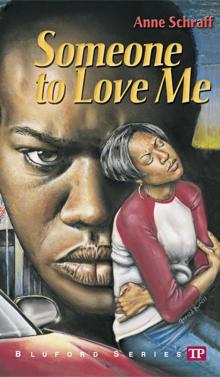 Someone to Love Me
Someone to Love Me A Matter of Trust
A Matter of Trust Until We Meet Again
Until We Meet Again If You Really Loved Me
If You Really Loved Me